 Are you looking for tools to simplify your social media activities?
Are you looking for tools to simplify your social media activities?
Many businesses feel overwhelmed when implementing their social media marketing.
Sometimes the solution is to focus on the right social media tools for your business.
We asked social media experts for their most valuable tool for small businesses using social media. Here are 13 tools to help you execute your social media strategy effectively.
#1: Crowdbooster

Crowdbooster is my tool of choice to manage social media activities on Facebook and Twitter.
This tool does many things to help me save time and streamline activities.
For example, it auto-posts on both my Facebook page and Twitter, tracks my new fans and followers, and gives me stats on how many times my content has been shared and retweeted.
It also tells me who my most engaged fans are, which allows me to reach out to fans individually if I choose.
What I like most about the tool is their posting time recommendations feature. Crowdbooster will suggest the best times of day for me to post based on my recent post engagement, as seen in the image below.

This ensures that I don't post on Facebook or Twitter when my audience tends to be less active. Since I've been following Crowdbooster's post time recommendations, I have seen a spike in my engagement by at least 20%.
Another great feature of Crowdbooster is that it will remind me if I have not yet responded to one of my followers or fans, as seen in the image here.

This is a great benefit because things move fast on Facebook and Twitter, so it's easy to miss some posts. I hate missing out on an opportunity to engage with someone who takes the time to reach out to me; therefore, I rely on Crowdbooster to keep me on top of my response time. In addition, Crowdbooster will highlight influential people who have recently followed me, allowing me the opportunity to connect with them directly from my dashboard if I choose.
Like so many others, my day is jam-packed and moves fast. I rely on Crowdbooster to keep a constant pulse of my Facebook and Twitter activity to ensure I'm optimizing these networks at all times.
Amy Porterfield, co-author of Facebook Marketing All-In-One for Dummies.
Get World-Class Marketing Training — All Year Long!
Are you facing doubt, uncertainty, or overwhelm? The Social Media Marketing Society can help.
Each month, you’ll receive training from trusted marketing experts, covering everything from AI to organic social marketing. When you join, you’ll also get immediate access to:
- A library of 100+ marketing trainings
- A community of like-minded marketers
- Monthly online community meetups
- Relevant news and trends updates
#2: Buffer

Recently the tool I've been using most often and finding the most helpful is Buffer. For small businesses, I think Buffer is one of the easiest ways to save time and improve your social media strategy.
Buffer is a scheduling tool for Facebook and Twitter, which lets you pre-program times for your updates to be posted. With the bookmarklet installed and your scheduled times already set, it can be as simple as two clicks to add an update to your Buffer account.
Although the debate continues over the authenticity of pre-scheduling your updates, Justin Flitter explains that scheduling is not necessarily the same as automation, and can be a great time-saver for your social media strategy.
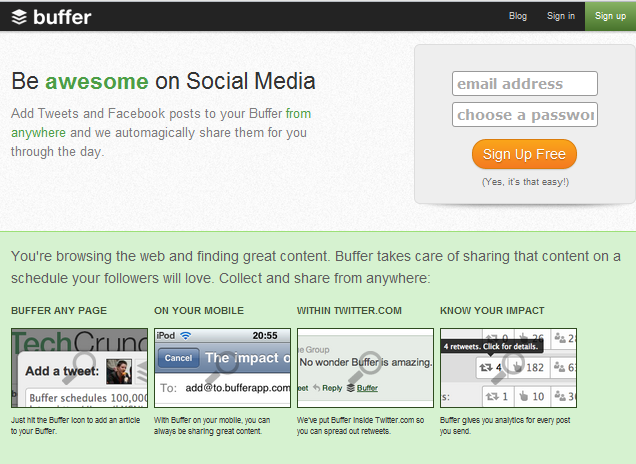
Corina Mackay, an entertainment-based social media manager and writer.
#3: WordPress

WordPress is without question my favorite tool for small business. With WordPress, small businesses can build very powerful dynamic websites that can form the hub of all other social media marketing.
WordPress-based blogs are easy to update and change, can directly incorporate other social media platforms and take full advantage of the benefits of blogging for business.
From an SEO perspective, Google's Matt Cutts once said, “WordPress takes care of 80-90% of (the mechanics of) search engine optimization (SEO).”
Most important, WordPress websites can be built and maintained on even the tightest budget, yet they can rival the websites of much larger companies. Answers to almost all technical questions can be found with a Google search. After building a number of WordPress sites for small businesses, I've yet to find its limitations.
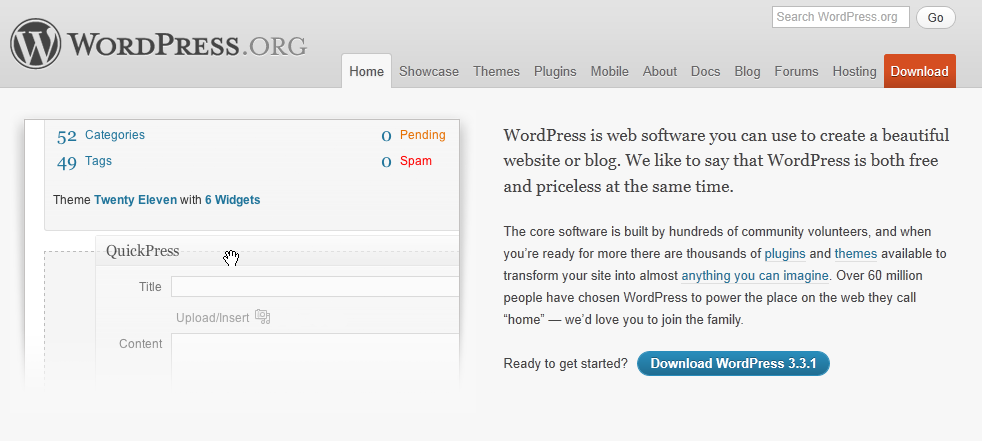
Jim Lodico, copywriter and marketing consultant specializing in creating powerful content and teaching businesses how to use blogs.
#4: Google Alerts

One of the easiest tools for businesses to use to monitor their online reputation is Google Alerts.
Each time Google finds a mention of your business, it will send you an email as it happens, daily or weekly. It's a free and indispensable tool!
It's a great “set it and forget it” kind of tool—simply set up email notifications for any mentions of your brand name, business name, unique product/service names and names of people who represent your business (think Matt Cutts for Google).
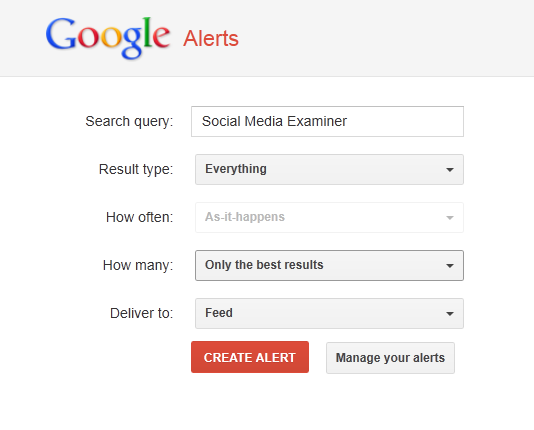
Kristi Hines, freelance writer, online marketing consultant and author of the popular blog Kikolani.
#5: Google Reader

To be effective with social media, you need to have relevant content to share. My tool of choice for staying current with nearly a hundred sources of online content is Google Reader. It’s not a sexy tool, but it’s fast and reliable.
As a content creator, I use Google Reader to develop a thorough understanding of topics from a variety of sources before sharing my perspective with my small business audience.
Google Reader works especially well as a widget within the iGoogle interface, which is set as my home page. This gives me an at-a-glance view of the most recent feeds, and the amount of accumulated content.
I segregate my feeds into general and priority, with the latter nearly always earning my full attention. Even when time is short, articles can be starred within Google Reader for later consumption.

Jeff Korhan, professional speaker, consultant and columnist on new media and small business marketing.
#6: Pagelever

My favorite tool this year was Pagelever. Pagelever provides detailed analytics around your Facebook brand or business page that goes beyond Facebook Insights.
The tool is very affordable. It presents a clean look at the performance of your brand page(s), offers visually appealing charts that you can immediately use in your presentations and generates valuable overview reports. I also appreciate the agility with which the product team implements ongoing Facebook changes.
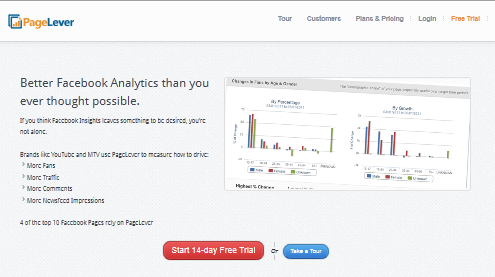
Ekaterina Walter, social media strategist at Intel.
#7: HootSuite Publisher

Almost every savvy social media manager I know uses HootSuite for some aspect of his or her social posting activities. It's hands-down one of my favorite tools for posting to Twitter, Facebook (personal profile, business pages and Groups) and LinkedIn (personal profile and Groups).
HootSuite also allows connections to Foursquare, ping.fm, a wordpress.com site, MySpace (really) and mixi (a social platform in Japan). The “Publisher” feature is an extremely handy scheduling interface that is my favorite part of my favorite tool! Here is how my regular HootSuite process goes:
- I check all @mentions on all the Twitter accounts I manage.
- I reply to any @mentions that need it—sending a thank-you for retweeting, answering questions, clicking through with shared links and so forth.
- Then I switch over to the Publisher tab and check all my scheduled tweets, add new ones to tweet later that day and copy and paste any that need to be tweeted again. This part of my regular tasks is so easy with HootSuite's calendar design.
- Then I check the Analytics tab—Quick Analytics to see which tweets are getting the most clicks. It's pretty easy to see which keywords are the most popular. Those tweets and others with those popular keywords are the ones I will make sure are scheduled to be posted again on that fabulous Publisher tab, at a different time than they were originally posted.
Bonus feature: If you have to create reports to bring to your team, HootSuite makes it really easy with download links for all of the tracking sections: Summary Stats, Clicks by Region, Top Referrers and Most Popular Links. Or you can organize a custom report that is sent to you each week.

Discover Proven Marketing Strategies and Tips
Want to go even deeper with your marketing? Check out the Social Media Marketing Podcast! Publishing weekly since 2012, the Social Media Marketing Podcast helps you navigate the constantly changing marketing jungle, with expert interviews from marketing pros.
But don’t let the name fool you. This show is about a lot more than just social media marketing. With over 600 episodes and millions of downloads each year, this show has been a trusted source for marketers for well over a decade.
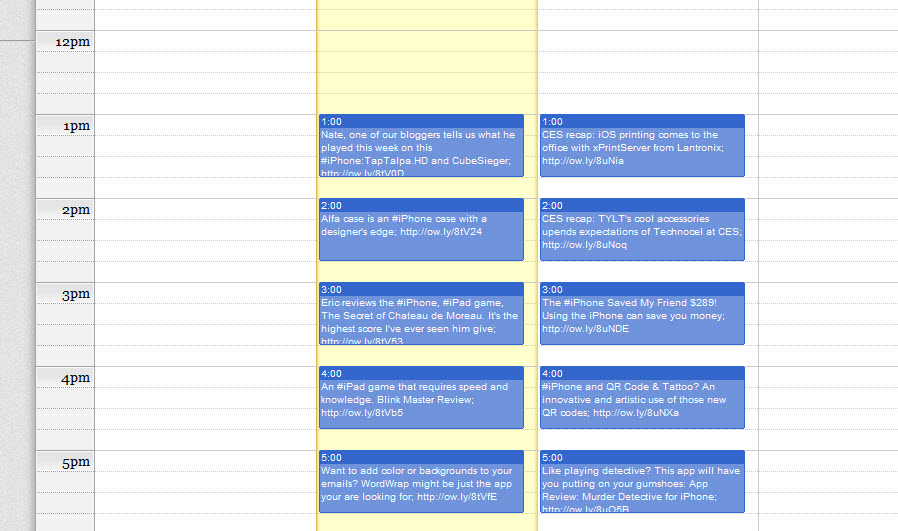
Phyllis Khare, co-author of Facebook Marketing All-In-One for Dummies, author of Social Media Marketing eLearning Kit for Dummies and social media director for iPhone Life.
#8: SocialOomph
I like SocialOomph because it allows me to schedule out tweets for all the articles we publish on Social Media Examiner.
I can also assign multiple individuals to help manage our Twitter accounts.
It also has a slick tool to filter who I should follow back on Twitter.
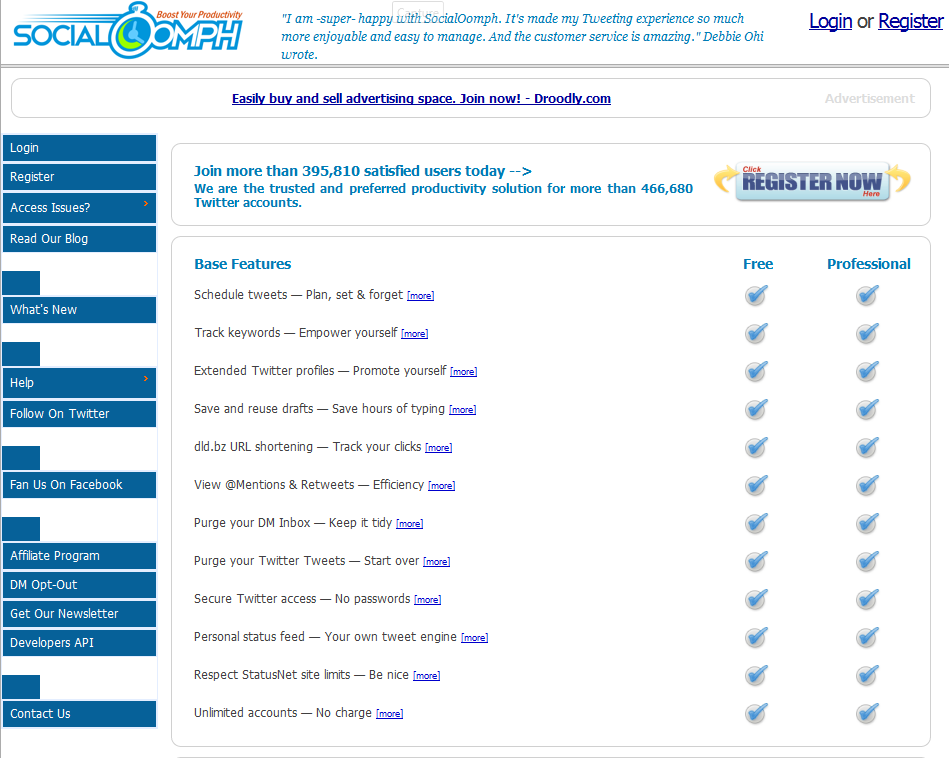
Michael Stelzner, founder and CEO of Social Media Examiner.
#9: Zite

Given the fact that we are increasingly using our smart mobile devices to stay connected and active in our social networks, I'm a big fan of mobile apps that can help make this process easier. One such app that is available is the Zite app for the iPhone and touchpads such as the iPad.
According to Zite, the Zite app is a “personalized magazine that gets smarter as you use it.” Not only can you plug in your social media profile credentials and pull in content that is being shared by your community, you can also connect your Google Reader account and choose from numerous publishers and media sites to build your personalized magazine.
Additionally, you can build more than one Zite profile! For example, I have both a personal profile and a work profile so that I can view and share content that is relevant to each of those networks.
The sharing tools include Twitter, Facebook, LinkedIn, Delicious, Instapaper and even Evernote (if you like to collect and save articles). These comprehensive sharing tools allow me to quickly go through and share any of the great content that I come across when I am on the go!
Typically I review my Zite app first thing in the morning, and whenever I'm mobile with idle time (i.e., waiting in line). It's a fantastic tool for discovering and sharing high-quality, relevant content from your smart mobile device in order to stay visible and valuable with your network connections!
Zite is a free personalized magazine that automatically learns what you like and gets smarter every time you use it.

Stephanie Sammons, founder and CEO of Wired Advisor.
#10: Evernote

Use Evernote to plan blog posts. If you blog often, you may find it helpful to have a well-defined and methodical approach to your writing. With Evernote you can:
- Create a standard blog template to use for all future articles
- Create relevant components within the blog template to organize your writing (e.g., Subject, Key Message, Title Ideas, Rationale, Examples, Images, Keywords, Links and so on)
- Assemble the various components of your blog into a logical sequence
- Write the entire article within Evernote and then publish on your blog
The benefits of using Evernote are:
- It’s easier to brainstorm ideas when you create one section of the article at a time
- Your blog notes are synced to other computers and devices so that you can work anywhere
- If you guest blog for others, Evernote provides an easily accessible record of all of your articles
- All components of your article (i.e., images, keywords, links, tags, etc.) can be saved in Evernote
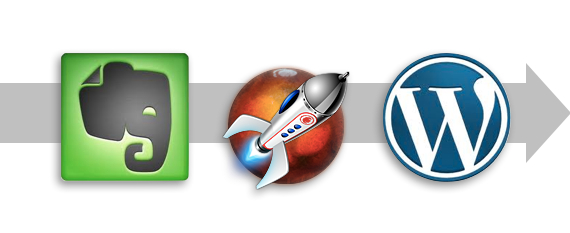
Patricia Redsicker writes book reviews for Social Media Examiner.
#11: HubSpot

Anyone who knows my background can likely guess my answer to this question: HubSpot. You see, 3 years ago, when my swimming pool company was on the brink of ruin due to the housing crash, I somehow stumbled upon HubSpot and their inbound marketing platform.
For those of you unfamiliar with their system, HubSpot is the ultimate all-in-one tool for small- to medium-sized businesses that are looking to elevate their online presence and generate more traffic, leads and sales.
In 2001, Google Ventures and Salesforce.com invested over $30 million in the company, the growth of which has been astounding in only a short few years since its inception.
Today, the platform includes:
- A super-simple CMS (content management system) that enables “non-techies” to build and design their own site
- A blogging platform
- Lead-nurturing tools
- Lead-tracking tools
- Keyword and SEO tools
- Landing page creation
- And many other features
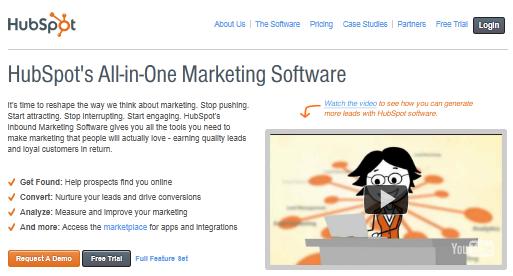
As a guy who knew the Internet was the future of small business success, I literally felt lost until I caught the vision of inbound marketing. And six months after embracing HubSpot, our company blog exploded. Since that time, we've never looked back. Today, it's the most trafficked swimming pool builder website in the world, and we're still growing by leaps and bounds.
It's because of this success that I'm so passionate about the subjects of inbound and content marketing in the first place. Without these tools, I literally don't know if I would even have a home today, much less my business. But instead of financial disaster, we are stronger than ever, and now I'm able to share this story with the world.
The whole thing has been an amazing experience, made possible by HubSpot building a system that a novice such as myself could learn to use, as well as providing training resources. And as for 2012, I see the HubSpot brand taking another quantum leap in growth and influence in the world of social media.
https://www.youtube.com/watch?v=0sv2tLYE0R0
Marcus Sheridan, small business owner, thought leader, popular social media speaker and founder of The Sales Lion.
#12: Disqus

Every blog should consider using the Disqus comment plugin. It’s one of the best social tools available, and is highly beneficial to your blog, which should be at the core of all of your marketing goals. I use it to give readers multiple options when signing in and commenting with OpenID, Facebook, Twitter, Yahoo, Google or Disqus account.
This increases the viral potential of your blog posts, because comments can be shared across social networks. But the plugin is so much more than that! It allows readers to track their comments and return to your site to engage in the conversation again. Plus the SEO benefits are paramount.
Because Disqus tends to make discussion last longer, you get a nice boost in SEO whenever engagement and real-time commenting take place. Readers can like or dislike existing comments for added interaction. You and your readers can become part of the Disqus community as well, where you'll be able to see what members in your community are saying on other blogs.
It’s an incredible tool for forming real relationships with your readers, and will help you expand your blog community considerably. Using the Disqus network, you can encourage your community to share more often by interacting with them outside of your blog network. It’s a network within a network that strengthens your bond with the people who love to read and comment on your posts!
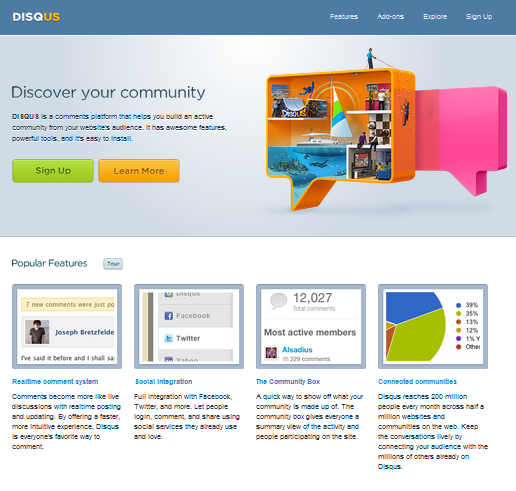
Carla Dewing, part-owner of Contrast Media and content marketing expert.
#13: NutshellMail

I actually have a semi-unknown “secret” weapon on this front. It's not something unheard of, but it doesn't get the buzz it should. My secret weapon: NutshellMail.
One of the biggest problems for people running a small business is trying to keep up with everything they have to do. They're in charge of bookkeeping, sales, HR, marketing and a million other things. Then, on top of that, they also have to handle social media!
Each and every morning I get an update on all of my social media activities via email. I can see who followed me on Twitter, what people are saying on Facebook, what updates my contacts have made to their LinkedIn accounts and much, much more. If you're looking for a great way to save time with your social media chores, NutshellMail may be just what you're looking for.
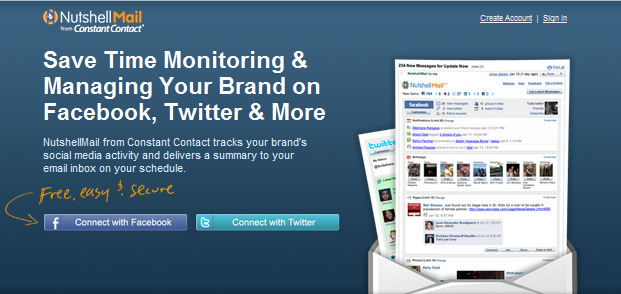
Jamie Turner, founder, the 60 Second Marketer and co-author of Go Mobile.
What are your best social media tools for small business? Please share them in the box below.
Attention Agency Owners, Brand Marketers, and Consultants

Introducing the Marketing Agency Show–our newest podcast designed to explore the struggles of agency marketers.
Join show host and agency owner, Brooke Sellas, as she interviews agency marketers and digs deep into their biggest challenges. Explore topics like navigating rough economic times, leveraging AI, service diversification, client acquisition, and much more.
Just pull up your favorite podcast app, search for Marketing Agency Show and start listening. Or click the button below for more information.

